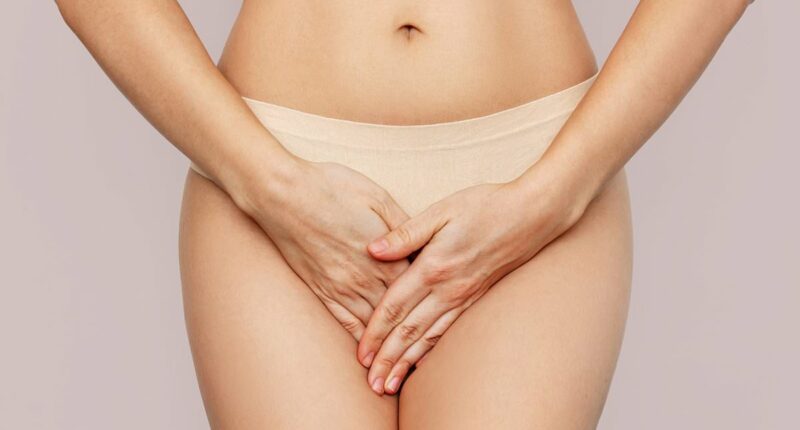Share this @internewscast.com
Urinary tract infections (UTIs) are increasingly common, causing discomfort for millions. However, experts suggest that some straightforward strategies can significantly reduce the risk of these infections.
In the UK, it’s estimated that half of all women will experience a UTI at some point in their lives. Alarmingly, nearly a third of these women will endure recurring episodes, leading to disrupted sleep, frequent toilet visits, and considerable pain.
Men are not exempt from this issue, with research indicating that around 12 percent will encounter a UTI at least once in their lifetime. The likelihood of developing a UTI doubles for men as they reach their seventies and beyond.
Typically, UTIs are treated with antibiotics. However, about one million women in the UK are battling chronic infections that persist despite medical intervention.
UTIs occur when harmful bacteria, such as E. coli, enter the body and travel up the urethra, the tube responsible for expelling urine. These infections can affect any part of the urinary tract, including the urethra, bladder, and kidneys.
They can affect the urethra, the bladder and the kidneys, which all covered by the term urinary tract.
From there, bugs can either cause an infection in the urethra itself, or travel up to the bladder and kidneys, triggering inflammation that can have serious consequences— such as severe kidney damage.
Infections make you pee much more often and more urgently than usual. Many patients also experience blood in their urine and pain in their tummy or lower back.
Data released by the NHS earlier this year revealed that 1.2 million bed days were down to patients admitted with UTIs at a cost of over £600 million.

It is estimated that one in two women in the UK are affected at some point in their lives but nearly a third suffer repeat episodes
Researchers have suggested that the increase in cases is in part down to antibiotic resistance – the bacteria that cause the infections have adapted meaning the medicine is no longer effective.
However experts say that following their tips patients can avoid getting a UTI all together.
Maintain good hydration
It’s a commonly held belief that drinking cranberry juice is the key to avoiding the painful infection but experts say that it is actually just six glasses of water a day that is needed.
A study published in JAMA in 2018 by researchers at the University of Miami supports the theory.
They studied 140 premenopausal women in Europe, all of whom suffered from recurrent UTIs.
The women were in the habit of drinking less than six eight-ounce glasses of water, suggesting that they might not be sufficiently hydrated.
For the 12 months of the study, the scientists had these women up their water intake so that they were drinking at least those six glasses every day.
They found that those who drank more water were far less likely to get UTIs.

Six glasses of water a day reduces the risk of UTIs
In fact, the less-hydrated women got nearly twice as many bladder infections over the year. They had an average infection frequency of about 3.2, compared to 1.7 for those who drank six or more glasses of water a day.
‘Adequate hydration is absolutely fundamental to UTI prevention. I recommend at least six to eight glasses of water daily, though you may need more if you’re exercising intensely or in hot weather,’ says Miss Sushma Srikrishna, consultant gynaecologist and urogynaecologist at London Bridge Hospital.
‘Proper hydration dilutes your urine and increases urination frequency, which is crucial because it flushes bacteria from your urinary tract before they have the opportunity to multiply and establish infection.
‘Think of it as a natural cleansing mechanism for your bladder.’
Post-intercourse urination
Experts say that making sure you pee after sex, is key to flushing out the potential infection.
‘Urinating shortly after sexual activity is one of the most effective preventive measures available,’ says Miss Srikrishna.

Experts say that making sure you pee after sex, is key to flushing out the potential infection
‘Sexual activity can introduce bacteria into the urethra, and emptying your bladder within 30 minutes afterwards helps flush out any bacteria before they can travel up the urinary tract.
‘This simple habit can significantly reduce your risk of developing a UTI, particularly if you’ve noticed a pattern of infections following intimacy.
‘It’s also important to avoid anal intercourse, as this is one of the biggest risk factors for UTI. The proximity of rectal bacteria to the urinary tract during this activity significantly increases the risk of bacterial transfer and subsequent infection.’
Prioritise proper hygiene
Simple tweaks to a patient’s hygiene routine can help them avoid UTI’s according to the experts.
‘Always wipe from front to back after using the toilet. This seemingly small detail is actually crucial in preventing the transfer of bacteria from the rectal area to the urethra. This is particularly important for women due to the anatomical proximity of these areas,’ says Miss Srikrishna.
She also explains that women should avoid potentially irritating feminine hygiene products, including douches, powders and strongly scented soaps in the genital area.
‘These can disrupt the natural bacterial balance and irritate delicate tissues. Opt for mild, unscented products and remember that the vagina is self-cleaning – aggressive hygiene practices are unnecessary and can actually be counterproductive,’ says Miss Srikrishna.
‘The underwear you wear can also have an impact, as tight or non-breathable materials can cause moisture to accumulate, which creates the perfect environment for bacteria. Choose cotton underwear that isn’t too tight.’

Always wipe from front to back after using the toilet. This seemingly small detail is actually crucial in preventing the transfer of bacteria from the rectal area to the urethra.
Avoid bladder irritants
Certain substances can increase bladder sensitivity and potentially make you more susceptible to infection according to the experts.
Common irritants include caffeine, alcohol, spicy foods, citrus fruits and juices and artificial sweeteners.
‘While these don’t directly cause UTIs, they can compromise your bladder’s natural defences. If you’re prone to UTIs, consider moderating your intake of these substances and monitoring whether you notice any correlation with symptoms,’ says Miss Srikrishna.
Consider taking a probiotic

Miss Srikrishna says a probiotic might help keep UTIs at bay
There is emerging evidence suggesting that taking probiotic supplements may be beneficial in preventing UTIs, particularly for those prone to recurrent infections.
The theory behind this approach is that maintaining a healthy balance of beneficial bacteria, particularly lactobacilli, in the urogenital tract may help prevent harmful bacteria from establishing infection.
‘Certain strains of Lactobacillus appear to play a role in maintaining a healthy vaginal and urinary tract microbiome, potentially by inhibiting the growth of harmful bacteria,’ says Miss Srikrishna.
‘The mechanism likely involves competitive exclusion – beneficial bacteria occupy sites where harmful bacteria might otherwise attach, and they may also produce substances that inhibit pathogenic bacteria.
‘There is some suggestion that Lactobacillus crispatus may be particularly effective against recurrent UTIs, though this research is still evolving.’
Use vaginal oestrogen
Experts advise women, particularly after the menopause, to use oestrogen creams, to reduce the risk of developing a UTI.
‘It’s common for postmenopausal people to experience recurrent UTIs,’ says Miss Srikrishna.
‘After menopause, oestrogen levels drop, which throws off the balance of bacteria in your vagina and bladder. Low oestrogen levels can also leave vaginal tissue thinner and drier, making it less equipped to prevent bacteria from entering the urethra.
Vaginal oestrogen therapy can be highly effective and is one of the most evidence-based prevention strategies available for preventing UTIs in postmenopausal women.
‘Administered as pessaries or cream, vaginal oestrogen helps restore the health and integrity of the genito-urinary tissues.
‘This treatment is safe and highly effective when taken long-term – by maintaining the health of these tissues, vaginal oestrogen helps re-establish the natural protective mechanisms that prevent bacterial colonisation.’
What to do if your UTI doesn’t go away by itself and when to seek help
While a mild UTI might go away on its own, or you may experience temporary symptom relief or fluctuation, typically bacterial infections require appropriate antibiotic treatment.
An untreated UTI can worsen, leading to more severe issues like a kidney infection or sepsis, so it’s best to seek medical advice if you experience any of the following symptoms:
Common symptoms include pain or burning sensation when urinating, increased frequency of going to the bathroom, blood in your urine, lower abdominal or pelvic pain and fever, chills or feeling generally unwell.
These symptoms indicate that bacteria have established infection, and you need proper medical assessment and antibiotic prescription.
Experts say that someone should seek immediate medical attention if you develop a high fever, severe back or flank pain, particularly on one side, nausea and vomiting, confusion or altered mental state
These symptoms may indicate that the infection has progressed to the kidneys, which is a serious condition requiring urgent treatment. Kidney infections can lead to permanent kidney damage or sepsis if left untreated.
Sometimes symptoms don’t improve even after completing a course of antibiotics, or they return shortly after treatment.
‘In these cases, your GP may arrange a urine culture to identify the specific bacteria and determine which antibiotics would be most effective. You may also be referred to a specialist for comprehensive evaluation,’ says Miss Srikrishna.















